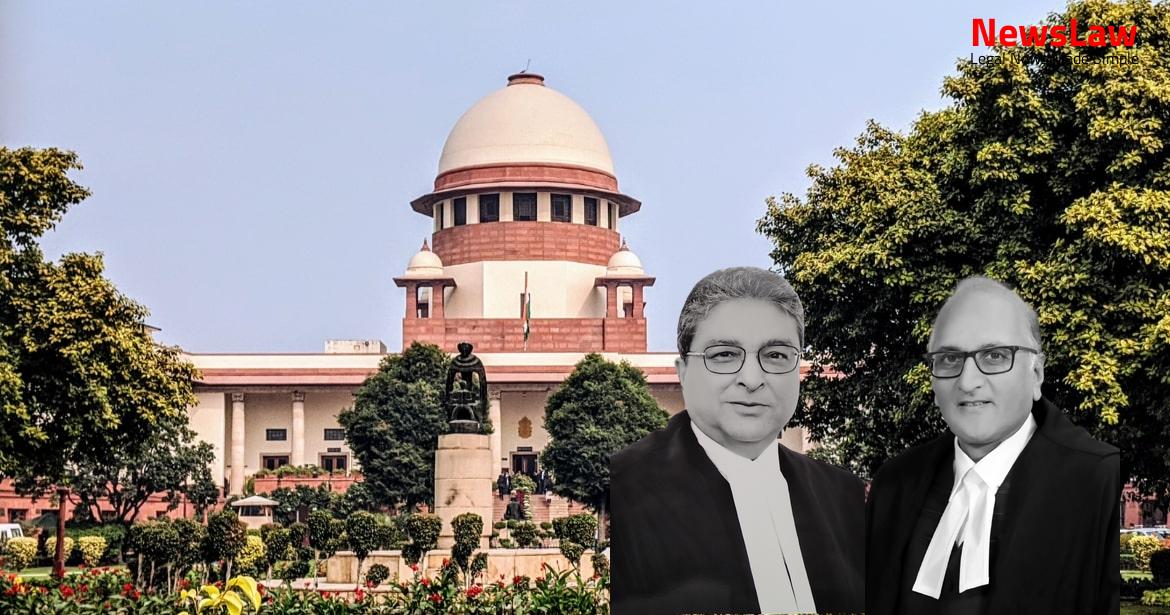In a significant legal battle, the case regarding the Autonomous Status of JBIMS was brought before the Supreme Court of India by University of Mumbai. The matter involved intricate discussions around autonomy, regulations, and the application of laws governing educational institutions. The judgment delivered sheds light on the complexities surrounding the autonomy status of JBIMS and its implications. Stay informed about this crucial verdict that impacts the education sector.
Facts
- JBIMS, a Department of the University of Mumbai, sought autonomous status for the academic year 2019-2020.
- Autonomous status was granted for 5 years from 2014-2019, not challenged by anyone.
- UGC concurrence is mandatory for granting autonomy to educational institutions.
- State of Maharashtra and JBIMS asserted treatement as an Autonomous Department.
- Admissions conducted based on non-autonomous status led to complications.
- University’s autonomy allows granting the same to its own departments without UGC concurrence.
- Writ Petitioners challenged admissions treating JBIMS as non-autonomous.
- High Court judgment passed ex parte, UGC not served, leading to appeal from University students.
- Admissions done in CAP Round 1 under the assumption of non-autonomous status.
- Confusion arose in 2019-2020 regarding JBIMS’ autonomous status extension.
- The High Court allowed the Writ Petition on 25.07.2019, directing the admissions process to be re-conducted by treating JBIMS as an Autonomous Institute.
- There is no provision for a deemed extension of autonomous status of an institute.
- Regulation 7.10 of the 2018 UGC Regulations applies if an Application under Regulation 7.8 is made at least 6 months prior to the expiry of the autonomy cycle.
- The Maharashtra Unaided Private Professional Educational Institutions Rules were made applicable to Government aided/non-aided institutions and University Departments.
- The Information Brochure dated 29.06.2019 clarified the status of JBIMS as an Autonomous Institute for admissions process.
- A division bench of the Bombay High Court took up the matter for final hearing and passed the judgment on 25.07.2019.
- Autonomy benefits stipulated in Regulation 3 are entitled upon grant of Autonomous College Status.
- The University had the power to confer autonomous status on JBIMS, and its autonomy status remained unaltered.
Also Read: Judgement on Auction of Assets in Hirakud Industrial Works Ltd. Case
Arguments
- The autonomy in this case is granted by the University of Mumbai, not the UGC.
- The UGC Regulations on autonomous status only apply to colleges, not University Departments.
- JBIMS as a Department of the University of Mumbai is not required to apply for autonomous status under the UGC Regulations.
- The Maharashtra Public Universities Act, 2016 distinguishes between a ‘College’ and a ‘Department.’
- The autonomy envisioned in the Maharashtra Public Universities Act is different from that in the UGC Regulations.
- The UGC Regulations are not applicable to University Departments as the University itself is autonomous.
- Throughout the Regulations, reference is made to ‘autonomous colleges’ and not University Departments.
- The eligibility clause in the UGC Regulations only refers to colleges falling under Section 2 (f) of the UGC Act.
Also Read: Land Dispute Resolution: A Supreme Court Judgement
Analysis
- Regulation 6 states that colleges under Section 2(f) of the UGC Act are eligible to apply for autonomous status.
- The eligibility condition includes aided, partially aided, and unaided/self-financing colleges of any discipline.
- The 2017 Guidelines clarify that all colleges under Section 2(f) of the UGC Act are eligible for autonomous status.
- The term ‘College’ as defined in the 2018 UGC Regulations refers to colleges affiliated to or constituent colleges of universities.
- University Departments are not included in the scope of the 2018 UGC Regulations.
- The Regulations are applicable to institutions seeking autonomous college status affiliated to or constituent colleges of universities in the country.
- JBIMS, a premier institution and a top management college, was declared non-autonomous by the Directorate of Technical Education and the CET-Cell, causing deprivation of bright meritorious students from across the country.
- The application for extension of autonomous status by JBIMS is pending consideration before the University of Mumbai.
- The autonomous status granted to JBIMS was from 11.07.2014 to 11.07.2019, and it is a Department of the University of Mumbai.
- The UGC clarified that JBIMS is a Department of the University of Mumbai and is not required to apply for autonomous status under UGC regulations.
- The delay in processing the application for extension led to uncertainty regarding the autonomous status of JBIMS, affecting the admission process.
- JBIMS, being a department of the University, should not be denied admission to meritorious students based on the uncertainty surrounding its autonomous status.
- The Directorate of Technical Education in the academic year 2018-19 issued a notification amending the Information Brochure, allocating 100% seats in JBIMS to the Maharashtra State quota.
- This notification was challenged by a student from the All India Quota in the case of Mayuri Umesh Munde v. Directorate of Technical Education & Ors. The Bombay High Court declared the 100% reservation in favor of state candidates as illegal and impermissible.
- Historically, Maharashtra consistently allocated 85% of seats in Autonomous Institutes to candidates from all universities in the state and 15% to candidates from the All India Quota.
- The Maharashtra Public Universities Act, 2016 outlines the procedure for granting autonomous status to university departments.
- Autonomy is defined in the Act as a privilege that permits a college, institution, or university department to conduct academic programs, examinations, develop syllabi, and issue certificates for passing exams.
- University departments, institutions, affiliated colleges, or recognized institutions can apply for autonomous status as per Section 122 of the Act. The autonomous status may be conferred by the Management Council based on Academic Council recommendations.
- Autonomous entities must promote academic freedom and scholarship for teachers and students, conducive to fostering intellectual development.
- Autonomous entities have the authority to establish their authorities or bodies, conduct academic and administrative activities, prescribe courses of study, teaching methods, hold examinations, and award degrees, diplomas, or certificates.
- Full academic and administrative autonomy is granted to autonomous entities, subject to the provisions of the Act, Statutes, and guidelines issued by the University Grant Commission.
- The High Court should consider the issues raised regarding the applicability of the 2016 Act and the 2018 UGC Regulations since they were not discussed earlier.
- Admissions for the current academic year 2019-2020 at JBIMS should be based on merit in the CET to maintain the institution’s national repute.
- Directorate of Technical Education and CET-Cell are directed to conduct admissions as per the Merit List published by CET-Cell treating JBIMS as an Autonomous Department of the University of Mumbai.
- Online admissions process should be completed within 2 weeks from the date of the order and candidates given a week thereafter to take admission in the respective colleges.
- Since the Writ Petition was decided without calling for counter affidavits, the matter is remitted to the High Court for determination of the issues of law related to the 2016 Act and the 2018 UGC Regulations.
Also Read: Bank Guarantee Dispute: ANZ Grindlays Bank v. Heavy Engineering Corporation Ltd.
Decision
- All pending Applications have been disposed of.
- No opinion has been expressed on the merits of the matter.
- The findings are of a prima facie nature.
- The aim is to ensure the admissions process for the academic year 2019-2020 does not face further delays.
- The Civil Appeal has been disposed of.
Case Title: ROHAN VIRANI Vs. THE STATE OF MAHARASHTRA
Case Number: C.A. No.-006753-006753 / 2019



